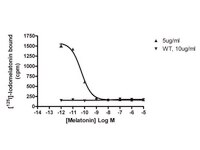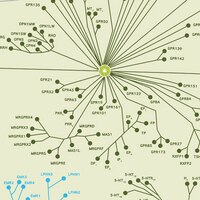HTS106M Sigma-AldrichChemiSCREEN™ Membrane Preparation Recombinant Human MT2 Melatonin Receptor
Human MT2 GPCR membrane preparation for Radioligand binding Assays & GTPγS binding.
More>> Human MT2 GPCR membrane preparation for Radioligand binding Assays & GTPγS binding. Less<<Recommended Products
Overview
| Replacement Information |
|---|
Key Spec Table
| Species | Host Cells | Protein Target |
|---|---|---|
| Human | Chem-1 | MT2 |
| References |
|---|
| Product Information | |
|---|---|
| Format | Membranes |
| Presentation | Liquid in packaging buffer: 50 mM Tris pH 7.4, 10% glycerol and 1% BSA with no preservatives. Packaging method: Membranes protein were adjusted to 1 mg/mL in packaging buffer, and dispensed at 1 mL/vial. Vials were rapidly frozen, and stored at -80°C. |
| Quality Level | MQ100 |
| Physicochemical Information |
|---|
| Dimensions |
|---|
| Materials Information |
|---|
| Toxicological Information |
|---|
| Safety Information according to GHS |
|---|
| Safety Information |
|---|
| Storage and Shipping Information | |
|---|---|
| Storage Conditions | Maintain frozen at -70°C for up to 2 years. Do not freeze and thaw. |
| Packaging Information | |
|---|---|
| Material Size | 200 units |
| Transport Information |
|---|
| Supplemental Information |
|---|
| Specifications |
|---|
| Global Trade Item Number | |
|---|---|
| Catalogue Number | GTIN |
| HTS106M | 04053252735462 |
Documentation
References
| Reference overview | Pub Med ID |
|---|---|
| Melatonin receptor signaling: finding the path through the dark Masana, M I and Dubocovich, M L Sci STKE, 2001:PE39 (2001) 2001 | 11698691
 |
| Selective MT2 melatonin receptor antagonists block melatonin-mediated phase advances of circadian rhythms Dubocovich, M L, et al FASEB J, 12:1211-20 (1998) 1998 | 9737724
 |
| Melatonin receptor antagonists that differentiate between the human Mel1a and Mel1b recombinant subtypes are used to assess the pharmacological profile of the rabbit retina ML1 presynaptic heteroreceptor Dubocovich, M L, et al Naunyn Schmiedebergs Arch Pharmacol, 355:365-75 (1997) 1997 | 9089668
 |









